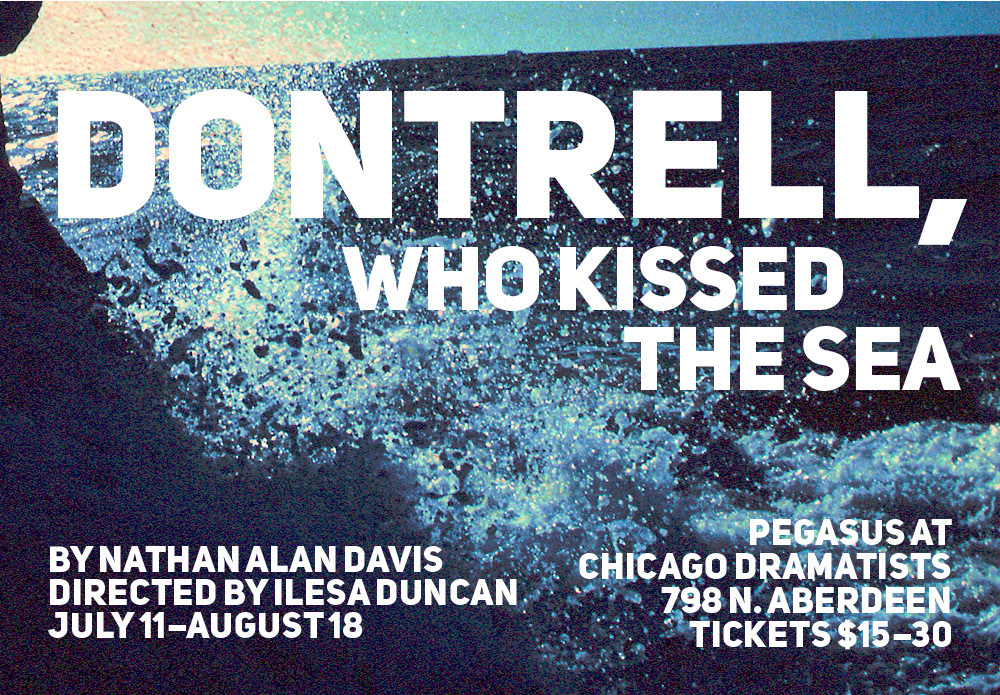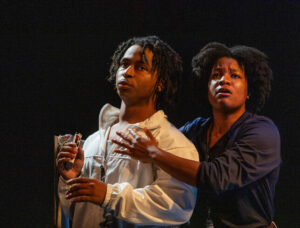
 **** Strong acting is the hallmark of Pegasus Theatre’s “Dontrell, Who Kissed the Sea”, written by Nathan Alan Davis and directed by ILesa Duncan. This is both a coming-of-age story as well as a young man’s search for his ancestral roots. Blake Dupree, in the role of Dontrell Jones III, does a wonderful job holding the entire production together from one scene to the next, which moves between the story of Dontrell’s life as an eighteen-year-old graduating from high school and several dream sequences which take him on an archetypical journey across the sea and hundreds of years back to his enslaved African ancestors.
**** Strong acting is the hallmark of Pegasus Theatre’s “Dontrell, Who Kissed the Sea”, written by Nathan Alan Davis and directed by ILesa Duncan. This is both a coming-of-age story as well as a young man’s search for his ancestral roots. Blake Dupree, in the role of Dontrell Jones III, does a wonderful job holding the entire production together from one scene to the next, which moves between the story of Dontrell’s life as an eighteen-year-old graduating from high school and several dream sequences which take him on an archetypical journey across the sea and hundreds of years back to his enslaved African ancestors.
Dontrell initially has a vivid and powerful dream about his progenitor aboard a slave ship coming to America. Because of this dream, Dontrell becomes fascinated with water and has a constant urge to be near it. This makes him repeatedly visit his cousin Shea (Aja Singletary), who happens to work at the city aquarium. Dontrell then goes a step further and jumps into the deep end of a swimming pool even though he knows he can’t swim. He is subsequently rescued from drowning by a lifeguard named Erika (Emma Wineman), who soon becomes his romantic interest. As their relationship grows, he subsequently brings her home to meet his family. Family members include his father (David Goodloe), his brother Robby (Zay Williams), his sister Danielle (Aundria TraNay), and his mother Maya Abram, who happens to have a field day serving her son’s high school graduation cake. In fact, some of the most outstanding acting happens in “home port” such as when Dontrell’s father tells his son that the fascination with the sea and with his African ancestry skips a generation: Apparently the young man’s grandfather had previously had the exact same intense dream and the same nagging desire to dip his toe into the past and into the otherworld. Thus the father’s recitation of this unusual family history is accompanied by an urgent word of warning.
Yet despite the close-knit family of parents and siblings, Dontrell is never deterred from his desire to venture out to sea. In fact, it is his strong desire to meet up with his distant ancestors that makes the journey of his life leap from the real into the fantastical. And Erika turns out to be just the right sort of partner to encourage him. So in addition to teaching him to become a fine swimmer and deep-sea diver, she chooses to join her boyfriend in his vision quest so that he might find deeper meaning in this world.

From the onset, we all know that Dontrell is a dreamer. Like Captain Kirk from the Starship Enterprise, he takes out a cassette tape recorder throughout the day and creates a “Captain’s Log” of his experiences to be preserved for future generations. We learn quickly that the recorder is his talisman, and everybody around the young man knows he is quirky in documenting the details of his life. But it is when he casts aside his desire for a personal legacy, that is the moment when life and death collide, and when great knowledge is presumably revealed or unleashed.
Emma Brandenburger’s costumes are great; I especially liked the fish outfit and the African-inspired garments. Some of the best parts of the show have to do with the imaginary sets as well as those which fill the imagination. I liked seeing Dontrell and Robby pretending to be in a car and Dontrell and Erika in a rowboat, etc. I especially enjoyed watching the projections having to do with water, like seeing the fish swimming in the aquarium, the scene with “Finding Nemo”, and all of the swimming scenes. But visually my favorite scene is when we see two actors in a television soap opera being watched by Dontrell’s mother in the comfort of their living room. Kudos to projection designer Eme Ospina-Lopez for such fine work! What allows these projections to predominate is Wynne Lee’s sparse scenic design and Brendan Marble’s unobtrusive lighting design. However, I would be remiss if I didn’t point out that the projection for the scene in the car needs to be played in reverse. As a car moves forward, the scenery behind the car is supposed to move backwards, but the video makes it go forward by mistake! Note that sound by Chris Kriz and props by Paloma Locsin work well for this show. An added touch is the dialect in Yoruba, thanks to Faramade Oladapo.

This is a fun and easy-going show. The directing is very good and unusual. Among other things, a number of chairs are set facing each other on either side of the stage, such that whenever a character is not in a particular scene they might sit out on a chair. So in addition to playing their parts, the cast members might be seated and stomp on the ground to provide motion and rhythmic sounds to accompany Dontrell’s adventure. Choreographer Tanji Harper has done great work in creating this living example of the spirits of the Jones’ family’s African predecessors.
As time goes on, we see how Dontrell’s journey demonstrates the progression of living the life of a child (where he is largely told what to do and how to do it) to the life of a young adult (where he chooses to take risks and act on his own accord). Now having said that, Dontrell is still a teenager, acting on a lack of maturity and a lack of understanding of possible danger, and his seeming fearlessness is likely the result of not having thought through the decisions that affect his life. But as Dontrell’s dream becomes more firmly situated in his psyche, we cannot help but empathize with his desire to connect with his personal past.
That said, we never fully know whether the young man actually realizes his goal. Does he really go back in time and space and meet his ancestors? Does he ever truly gain the secrets of the sea’s hidden history, or is all of this in his imagination? Does he live or die? It is ambiguity that stirs the audience in their comments among themselves once the performance is over. But this is a good thing. Theatre allows (if not often encourages) the suspension of disbelief, and the most critical aspect of this play is that it follows in the tradition of myth. More broadly, the story deals with the existential origins of the black people who first came to America’s shores. I loved the ending, and this is all the more reason you should see this production.
“Dontrell, Who Kissed the Sea” is playing through August 18, 2024, at Chicago Dramatists, 798 N. Aberdeen, in Chicago. ( right by the corner of Milwaukee and Chicago Avenues
Tickets are $15-$30.

Performance schedule:
Fridays – 7:00 p.m.
Saturdays – 2:30 and 7:00 p.m.
Sundays – 2:30 p.m.
For more information and to purchase tickets, visit https://pegasustheatrechicago.org/.
To see what others are saying, visit www.theatreinchicago.com, go to Review Round-Up and click at “Dontrell, Who Kissed the Sea”.






More Stories
“The Firebugs” reviewed by Julia W. Rath
“The Book of Grace” Al Bresloff with another from Paul LIsnek
“The Last Five Years” MILWAUKEE